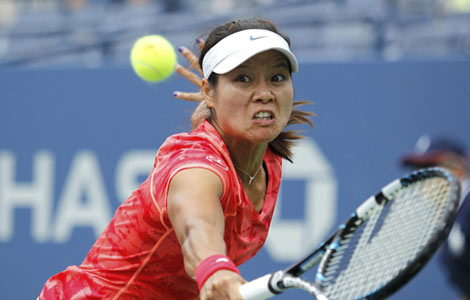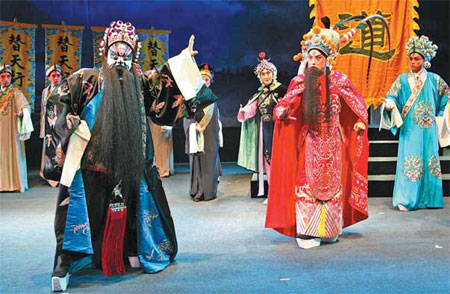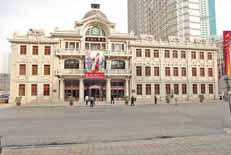An opera legacy lives on
Updated: 2013-08-27 06:51
By Zhu Chengpei and Zhang Xiaomin (China Daily)
|
||||||||
|
Dalian Peking Opera Company head Yang Chi (left) performs with famous Peking Opera actor Yu Kuizhi. Provided to China Daily |
|
Wang Minzhong shows Gao Cangjian photos of his performance in the Hongji Stage in Dalian, Liaoning province. Zhang Xiaomin / China Daily |
|
Yang Chi is a key factor behind the popularity of DPOC. Provided to China Daily |
|
The Hongji Stage has become a magnet for Dalian's Peking Opera fans. Zhang Xiaomin / China Daily |

In Dalian, Peking Opera and its actors have found a supportive home full of adoring fans. Zhu Chengpei and Zhang Xiaomin join the show in Dalian.
The Hongji Stage in downtown Dalian in Liaoning province has been a magnet for Peking Opera fans of the northeastern coastal city.
After a century of ups and downs, the stage built in 1908 sparkles again after being restored in 2010.
Wang Minzhong, a 35-year-old English teacher, goes to the theater every weekend.
"Prior to seeing a live Peking Opera, I wondered if I could understand a single word of it," Wang says.
He immediately took to it and it triggered his interest to find out more about the opera, often said to be a quintessence of Chinese culture. The more he knows the more he loves it.
Initially, he was attracted by the stories, the wonderful gestures and the fighting. Later, he found a certain beauty in the facial paintings, singing, costumes and everything else in the theater art.
"The classical arts are able to make people feel at peace," he says. "I know a Japanese friend, who is a senior executive of a Japanese company in Dalian. He used to enjoy live shows to relieve stress."
Goku Cigei came to Dalian in 2005. In the beginning, he went to the theater just to kill time. Soon, he was enchanted. He loves the art form so much that he established a fan club and tried to introduce Peking Opera to more Japanese.
By March 2011, when he returned to Japan, he had watched more than 260 live Peking Opera shows and made notes for each of them.
Wang was the only Chinese member of the club. He remains in touch with the club founder via the Internet to discuss about the opera.
Performers from the Dalian Peking Opera Company give live shows every Saturday afternoon. Before the Hongji Stage reopened in 2010, they performed at the Qilin Stage for 15 years.
Wang has been following the shows since 2006, befriending some actors and actresses.
He and some other fans take photographs and videos of the performers, and use them to discuss with them ways to improve the shows.
"They are not nitpicking. They give us more encouragement. They love Peking Opera and want to help us perform better," says 19-year-old actor Gao Cangjian.
Usually, a performance on Saturday attracts about 300 audiences. There are some 30 regular fans. When Gao sees the familiar faces among the audience, he feels good.
"I feel motivated," Gao says.
Wang, Gao and more than 200 fans and actors of DPOC formed an online group named Dalian Peking Opera Backyard at the micro-blogging platform Sina Weibo, communicating about the art they love.
Most of the members are young and well-educated. They include university lecturers, public servants, employees of foreign-invested companies, and journalists.
Wang is the administrator of the Sina Weibo account.
"I also go to theaters in other cities within China. Usually after the show, I hear fans complaining about the performance. That's quite different from the atmosphere here in Dalian," Wang says.
"The fans in Dalian are enthusiastic. They love not only the leading actors but also the extras. They treat all the actors, old or young, famous or not, equally with support," Zhao Zhenjiang, chief editor of Dalian Evening News, the most popular newspaper in the city, says.
Zhao, an enthusiast himself, says even though the fans are familiar with the leaders of the theater, they are not freeloaders.
Some even pay more to support the actors who perform or go to competitions in Beijing, Shanghai or Tianjin.
They also introduced the art to more people. When they see someone who is curious about the opera, they will buy a ticket for him or her to watch a live show.
"You can feel the beauty of Peking Opera when you watch it live. But when you watch it on TV, it is flavorless. Many people become a fan only after seeing a live show," Zhao says.
A fan with the pseudonym Dehui has a column with Dalian Evening News, commenting on Peking Opera and painting cute cartoon images of Peking Opera characters.
Other local newspapers also report frequently on the art. A Sina Weibo user named Jingjuyupincha (meaning "Peking Opera and tea") says he read more than 5,000 related reports in recent years and found Tianjin and Dalian the best among domestic cities in popularizing Peking Opera.
"Newspapers in Dalian report not only on their own actors but also those coming to perform in Dalian from other places," he wrote on his weibo.
Last year, Dalian government allocated 120 million yuan ($19.6 million) for the theater to create new plays, cultivate talents, and buy costumes, according to Yan Jianfu, party secretary of the theater.
The theater tries to provide opportunities for young actors.
Besides the Saturday performances, it invites at least one famous artist to perform at the Hongji Stage every month.
The young can then learn from the best Peking Opera performers, such as Yu Kuizhi, Li Shengsu, and Meng Guanglu.
"Last year, we had about 200 live shows. All these help them grow faster," Yan says.
Bai Yang, 24, joined the Dalian theater as a performer after she won a national competition in 2012. Before that she played the role of daomadan (young female warrior) at a theater in Shenyang, capital of Liaoning province.
The Hongji Stage is a great joy to her.
"When I was in Shenyang, I seldom had the chance to perform onstage. It was painful - having endured many years of practice but had no chance to demonstrate my skills," Bai says.
Yang Chi, 52, is a big name behind the popularity of DPOC, playing jiazi hualian (male character with a painted face, often associated with rude people). He gave up the chance to join China National Peking Opera Company to foster the art form in Dalian.
"The theater in Dalian needed me more. If I had not come back, the theater might have been shut down," he says.
In 2000, Yang became head of the Dalian theater. Since then, the cultivation of young actors has become the priority.
With years of efforts, they have cultivated some good young performers. Some of them even play leading roles.
"Dalian has first-class venues and facilities for Peking Opera. More importantly, it boasts the best audience in the country. They really know the art well," says Yan Dewei, a TV director with CCTV in an interview with Dalian Evening News.
Contact the writers through
zhangxiaomin@chinadaily.com.cn.
(China Daily USA 08/27/2013 page8)

 Chinese navy starts escort mission at Gulf of Aden
Chinese navy starts escort mission at Gulf of Aden
 McGrady retires, considers career in China
McGrady retires, considers career in China
 Li Na breezes into US Open second round
Li Na breezes into US Open second round
 China and India set to resume military drills
China and India set to resume military drills
 Dwight Howard, Kai Ko promote fitness in Beijing
Dwight Howard, Kai Ko promote fitness in Beijing
 DC panda cub doing well
DC panda cub doing well
 Muslim Brotherhood leaders, Mubarak face trial
Muslim Brotherhood leaders, Mubarak face trial
 Cliff diving in the city
Cliff diving in the city
Most Viewed
Editor's Picks

|

|

|

|

|

|
Today's Top News
Nation must adjust when US tapers QE
Prosecutors seek heavy punishment for Bo Xilai
Pet abuse videos prompt outrage
China joins anti-tax fraud effort
UN to contact US over spying report
Foreigners nabbed for personal info trafficking
PLA Navy heads for routine drill in W.Pacific
Antitrust 'not target' foreign firms
US Weekly

|

|











